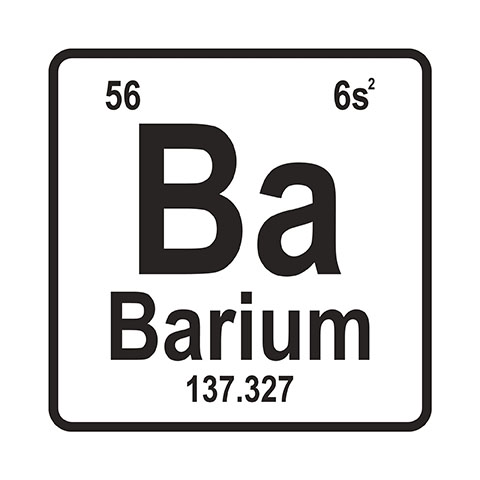
< Back
barium
Definition
Barium is a chemical element with the symbol Ba and atomic number 56. It is a soft, silvery-white metal that is highly reactive. Barium is found in nature as a trace element in some minerals.
Barium is used in a variety of applications, including:
- Medical imaging: Barium sulfate is used as a contrast agent in X-rays and CT scans.
- Fireworks: Barium salts are used to create the brilliant green colour in fireworks.
- Glassmaking: Barium carbonate is used to make glass that is opaque to infrared radiation.
- Batteries: Barium is used in some types of batteries.
Barium is a toxic metal, and it can be harmful if it is ingested or inhaled. Symptoms of barium poisoning include nausea, vomiting, diarrhoea, and seizures. In severe cases, barium poisoning can be fatal.
Here are some other key things to know about barium:
- It is a soft, silvery-white metal.
- It is highly reactive.
- It is found in nature as a trace element in some minerals.
- It is used in a variety of applications, including medical imaging, fireworks, glassmaking, and batteries.
- It is a toxic metal, and it can be harmful if it is ingested or inhaled.
How can the word be used?
Barium is used in fireworks to create a green colour.

Different forms of the word
Noun:
barium (a chemical element with the symbol Ba and atomic number 56).
Adjective:
barium (of or relating to barium).
Verb:
to barium (to treat with barium).
Etymology
The word "barium" comes from the Greek word "barys", which means "heavy". The element barium was discovered in 1774 by Carl Scheele, a Swedish chemist. Scheele found barium in the mineral barite, which is also known as heavy spar.
Question
What can barium be used to make?
AQA Science Exam Question and Answer
Question:
Define the chemical element "barium," including its symbol, atomic number, and key properties. Describe one significant application of barium in real-world scenarios.
Answer:
Barium is a chemical element with the symbol Ba and atomic number 56. It is an alkaline earth metal, located in Group 2 of the Periodic Table. Barium is a soft, silvery-white metal with a low melting point and a high reactivity with water and air.
One significant application of barium is in the medical field, where barium compounds are used in diagnostic imaging tests. Barium sulfate is a radiopaque contrast medium used in X-ray examinations, such as barium swallow and barium enema. These tests help visualise the gastrointestinal tract, allowing medical professionals to detect abnormalities and diagnose conditions like gastroesophageal reflux, ulcers, and tumours. Barium's ability to absorb X-rays makes it an invaluable tool in non-invasive medical imaging procedures.